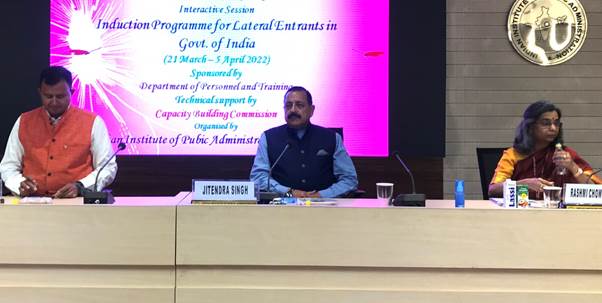


The Narendra Modi government faced backlash from the opposition and its own allies regarding lateral appointments in the bureaucracy, which led to a swift change in direction. This move came after Union Minister Jitendra Singh directed the cancellation of an advertisement for 45 posts and Union Minister Ashwini Vaishnaw's statement on the government's commitment to social justice. The government's cautious approach is attributed to the successful opposition campaign during the Lok Sabha elections, where Congress leader Rahul Gandhi consistently criticized the government's actions towards reservations. With Assembly elections coming up, the BJP is wary of any further damage to its SC/ST and OBC vote bank, and has yet to clarify its stance on sub-categorization and the Supreme Court's observation on creamy layer exclusion.
Lateral Entry in Indian Bureaucracy: Controversy and Course Correction
Background
The Indian government has been implementing a "lateral entry" policy since 2020, aimed at bringing in talented professionals from outside the bureaucracy to fill senior positions. This policy has been met with mixed reactions, with some supporting the infusion of fresh ideas and expertise, while others expressing concerns about the potential erosion of meritocracy and reservation policies.
Recent Controversy
In April 2023, the Narendra Modi government faced backlash from the opposition and its own allies regarding lateral appointments in the bureaucracy. Union Minister Jitendra Singh directed the cancellation of an advertisement for 45 posts, while Union Minister Ashwini Vaishnaw emphasized the government's commitment to social justice.
This move came after Congress leader Rahul Gandhi's sustained criticism of the government's actions towards reservations during the Lok Sabha elections. With Assembly elections approaching, the BJP is wary of any further damage to its SC/ST and OBC vote bank.
Government's Response
The government's cautious approach is attributed to the successful opposition campaign during the Lok Sabha elections. The BJP has yet to clarify its stance on sub-categorization and the Supreme Court's observation on creamy layer exclusion, indicating a desire to balance its commitments to merit and reservation.
Top 5 FAQs
1. What is lateral entry in the bureaucracy?
Lateral entry refers to the recruitment of experienced professionals from outside the bureaucracy to fill senior positions.
2. What are the objectives of lateral entry?
To infuse fresh ideas, expertise, and diversity into the bureaucracy.
3. What are the concerns about lateral entry?
Erosion of meritocracy, undermining of reservation policies, and possible favouritism.
4. What is the government's current position on lateral entry?
The government has adopted a cautious approach, balancing its commitments to merit and reservation.
5. What are the ongoing debates related to lateral entry?
Sub-categorization of reserved categories, exclusion of creamy layer candidates, and the impact on the overall functioning of the bureaucracy.
Conclusion
The government's decision to reassess its lateral entry policy highlights the intricate balance it must strike between promoting merit and ensuring equity in the bureaucratic apparatus. The upcoming Assembly elections will likely further shape the debate and the government's approach to this contentious issue.

On the 75th death anniversary of Sardar Vallabhbhai Patel, Prime Minister Modi paid tribute to the "Iron Man" of India, highlighting his immense contribution in unifying the country after Independence. Known as India's first Deputy Prime Minister and Home Minister, Patel was a pivotal figure in the integration of over 560 princely states to form the Republic of India. His legacy as a leader and visionary continues to inspire generations in nation-building and governance.

Maurya pays tribute to Sardar Patel on his 150th birth anniversary, hailing him as a symbol of India’s unity and strength. He praises the Prime Minister’s efforts in realizing Patel’s dream of a united and self-reliant India. The Deputy Chief Minister also emphasizes the importance of the Statue of Unity in showcasing India’s cultural pride and resolve. He urges citizens to visit the monument, which stands as a testament to Patel’s legacy of a united and strong India.

Despite facing setbacks such as rape charges against one of its MLA and increased welfare pension by the ruling party, the United Democratic Front (UDF) emerges victorious in the local body elections in Kerala. The results show a strong anti-incumbency wave and the UDF manages to win key constituencies like Kochi, Kannur, Kollam, and Thrissur in a surprising turn of events. This has boosted the confidence of the Congress, with senior leaders like Rahul Gandhi and Ramesh Chennithala terming it as a clear sign of their growing popularity in the state.

Amid the recent terrorist attack targeting the Jewish community in Sydney, Australia, US President Donald Trump offered words of reassurance and encouraged prideful celebration for those observing Hanukkah. He expressed his disdain for the attack and praised the bravery of the man who tackled one of the attackers. Trump also reminded everyone to come together to celebrate the holiday and condemn such heinous acts of hate.

Nitin Nabin, BJP's newly appointed National Working President, thanked Prime Minister Narendra Modi and the party's senior leaders for entrusting him with the top organizational responsibility. He also credited the hardworking party workers for the success of BJP across the nation. Nabin hit out at the Congress for using abusive language against PM Modi, stating that it only strengthens him. He also praised the party workers for their dedication and hard work in maintaining BJP's winning streak in his constituency as well as West Patna.

Maharashtra Chief Minister Devendra Fadnavis has dismissed criticism from the Opposition regarding the law and order situation in the state, citing a high conviction rate of 96.24%. He also highlighted the improved response time for the 'Dial 112' service and a decrease in crime in Pune. Additionally, Fadnavis addressed concerns over crimes against women and children and stated that the registration rate for complaints is over 99%.

The BJP's Parliamentary Board, on Sunday, appointed five-term MLA and Bihar Cabinet Minister Nitin Nabin as the party's national working president. This sets him up as a potential successor to current national president J P Nadda in January, marking a shift in the party's leadership towards a younger generation. With crucial Assembly elections approaching, Nabin's election as party president could have significant implications on the party's future direction, and his appointment has received praise from top leaders like Prime Minister Narendra Modi and Home Minister Amit Shah.

Amid the chaos and tragedy of the Sydney Bondi Beach attack, a bystander has emerged as a hero after bravely disarming a gunman. Ahmed al Ahmed, a local fruit shop owner, charged at one of the gunmen and successfully took away their weapon, risking his own life in the process. He has since been identified as a father of two and is receiving treatment in the hospital, while being praised globally for his heroic actions.

The Bharatiya Janata Party has shocked many with its decision to elevate Bihar minister Nitin Nabin as its national working president, making him the youngest person to hold the position. This move marks a significant leadership reset within the party and is likely to have a domino effect on the internal hierarchy. Along with the appointment of an OBC leader as BJP's UP unit president, this strategic shakeup suggests that the party is preparing for the next electoral cycle and setting the stage for a post-Modi era.

In the aftermath of the National Democratic Alliance's landslide victory in the Bihar Assembly elections, the Bharatiya Janata Party has selected Nitin Nabin, a prominent social worker and committed political activist, as the party's National Working President. With a strong background in grassroot engagement and solid organisational skills, Nabin's appointment reflects the BJP leadership's confidence in his capabilities. As the son of a senior BJP leader, Nabin belongs to a well-respected Kayastha community and has proven himself as both an effective minister and an able politician over the past 14 years.